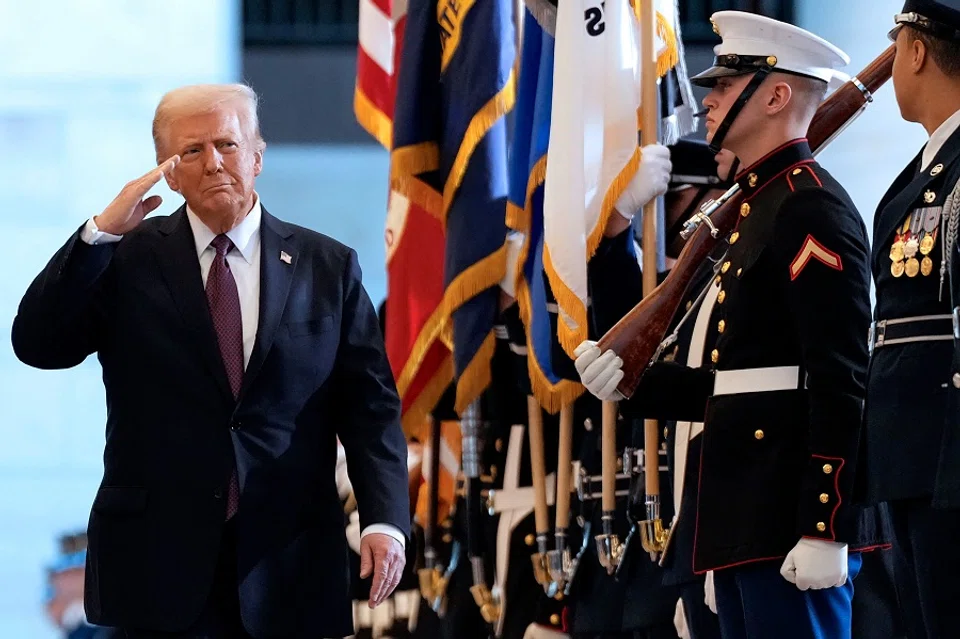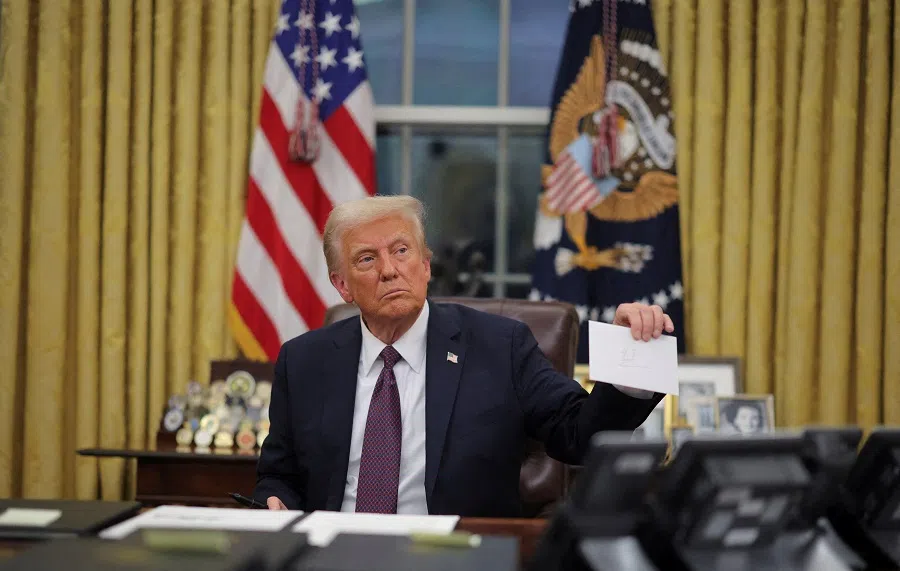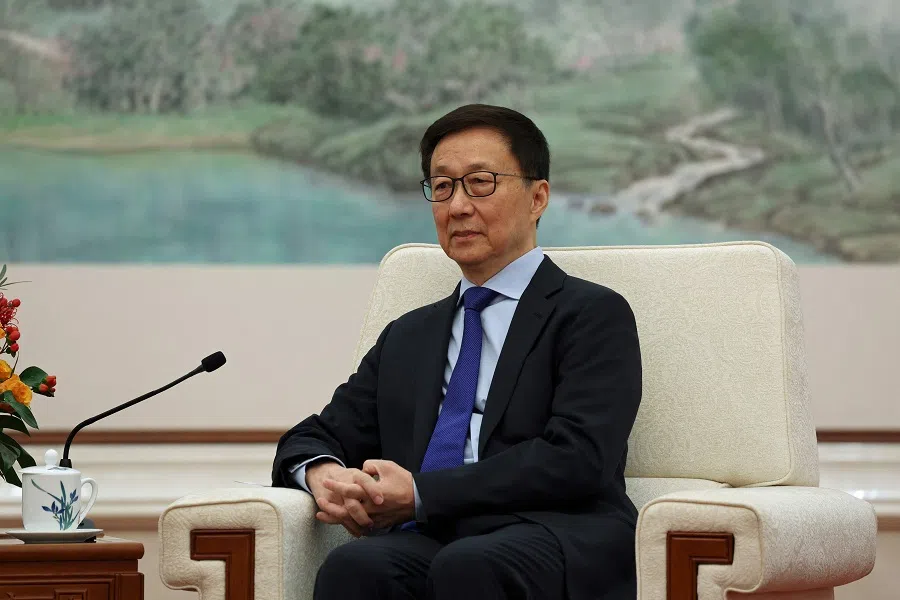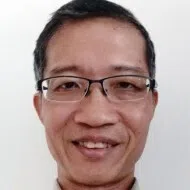The significance of China’s representation at Trump’s inauguration
Chinese Vice-President Han Zheng’s appearance at US President Donald Trump’s inauguration sends a clear message that Beijing is willing to work with the US to further stabilise US-China relations and even grow the relationship. ISEAS researcher Lye Liang Fook explains.

Views on Chinese President Xi Jinping’s special envoy Han Zheng’s presence at Donald Trump’s presidential inauguration have ranged from it being a safe choice, a positive diplomatic signal to an unusual diplomatic overture. Given the variety of views, it is worthwhile to set things in context by assessing the level of importance of China’s special envoys, the objectives Beijing seeks to achieve by sending Han Zheng and the implications for US-China relations.
Today, the practice of sending a bureau head or vice-minister as Xi’s special envoy has virtually ceased, most probably due to its rather junior level.
In a break with tradition, Trump has invited foreign dignitaries to his inauguration. The response of the invitees is foremost a show of support for Trump who is the second president in US history to return to office for a non-consecutive term and one whom they would have to work with at least for the next four years. Their representation is also a sign that the invited countries would like to start their relationship with a president, known to be mercurial and transactional, on a right note. The belief is that getting on Trump’s good side would make it easier for these countries to get along with America.
One way to examine Han Zheng’s representation is to compare him with the other dignitaries present at Trump’s inauguration. Han Zheng is certainly more senior than the ministerial-level representatives such as Australia’s Foreign Minister Penny Wong, Japan’s Foreign Minister Takeshi Iwaya and India’s External Affairs Minister S Jaishankar who are the US’s Quadrilateral Security Dialogue (Quad) partners. But he is a rung lower than the heads of state or government including Argentina’s President Javier Milei, Ecuador’s President Daniel Noboa, and Italy’s Prime Minister Giorgia Meloni. Nevertheless, Han Zheng can be considered to be of a relatively senior level. Within the Chinese hierarchy, Han Zheng is believed to be ranked eighth in the Communist Party of China hierarchy, after the seven members of China’s Politburo Standing Committee (PSC).
Following an established set of protocols
A more accurate way to assess Han Zheng’s representation is to situate him in China’s established set of protocols for the inauguration of foreign leaders. Since Xi became state president in 2013, he has sent numerous special envoys to such events. There are at least five distinct levels of seniority with regard to these envoys. The first, starting from the lowest, is at the bureau head or vice-minister level. These include Vice-Minister Zhong Shan, who attended the Belarus president’s inauguration in 2015, and the head of the State Forestry Administration Zhang Jianlong, who was at the inauguration of the Central African Republic president in 2016. Today, the practice of sending a bureau head or vice-minister as Xi’s special envoy has virtually ceased, most probably due to its rather junior level.
Another possible consideration is that in line with China’s stature, it would look more presentable if Beijing were to send higher-level envoys. The second level is a ministerial-level special envoy. There have been a number of such envoys including Minister of Culture Cai Wu, who attended the Iranian president’s inauguration in 2013, Minister of Housing and Urban-Rural Development Chen Zhenggao, who was at the Republic of the Congo president’s inauguration in 2016, and Minister of Industry and Information Jin Zhuanglong, who was present at the Dominican Republic president’s inauguration in 2024.
... Han Zheng’s presence shows that China attaches great importance to its ties with the US and would like to set the right atmospherics early on in the Trump 2.0 administration.
The third category is at the level of the vice-chairman of the Chinese People’s Political Consultative Conference (CPPCC), a national-level political advisory body. There has been a number of such envoys including vice-chairman Wang Zhengwei, who attended the Mali president’s inauguration in 2013, vice-chairman Wang Jiarui, who was at the Kenyan president’s inauguration in 2017, and vice-chairman Shen Yueyue, who was present at the Democratic Republic of the Congo president’s inauguration in 2024. The fourth level, a notch higher, comprises the vice-chairman of the standing committee of the National People’s Congress (NPC), a national-level body with legislative powers. They include vice-chairman Yan Junqi, who was at the Indonesian president’s inauguration in 2014, vice-chairman Tie Ning, who attended the Mexican president’s inauguration in 2024, and vice-chairman Wang Dongming, who was dispatched to the Venezuela president’s inauguration in 2025.

The fifth and highest grade of special envoy is the vice-president of China. Former Vice-President Wang Qishan had attended the Indonesian president’s inauguration and Japanese emperor’s enthronement in 2019, the Philippine and South Korean presidents’ inauguration in 2022, and the Brazil president’s inauguration in 2023. Current Chinese Vice-President Han Zheng, who replaced Wang Qishan in March 2023, was at the coronation ceremony of King Charles III of the UK in 2023 and the Indonesian president’s inauguration in 2024. Therefore, Han Zheng’s presence at Trump’s inauguration is in line with China’s existing practice for such overseas events.
Xi’s no show not a snub
The Chinese president has never before attended the inauguration of foreign leaders. Therefore, it should not be a surprise or be regarded as a snub to America due to Xi’s no show at Trump’s inauguration even though Trump had invited him. Another reason is that China regards the US presidential inauguration as well as the inauguration of other foreign leaders as a domestic affair, which does not warrant the participation of China’s head of state.
Moreover, as a big country, China has become more status conscious and is careful with the signals it sends to other countries. In his overseas travels, Xi usually attends high-profile multilateral forums and/or conducts state visits that befits his status as China’s head of state. During such visits, Beijing seeks tangible outcomes that reinforce the success of Xi’s head-of-state diplomacy. If Xi were to attend Trump’s inauguration, he would in a way be “belittling” himself as he would be one among the many guests and dignitaries present and would not receive the kind of attention that he seeks. Furthermore, it would be unthinkable for Xi to be present at the same venue as Taiwan’s cross-party parliamentary delegation as this would be a tacit recognition that Taiwan and China share the same political status, and that Taiwan is a separate political entity from China.
China has further warned the US not to challenge its four red lines, i.e., the Taiwan question, democracy and human rights, China’s path and system, and China’s development right. But for now, at least momentarily, both sides are trying to play nice.
China’s message to America
From China’s perspective, Xi has given Trump face by dispatching Han Zheng, his highest-level special envoy for the inauguration. In turn, the US had accorded him due respect by arranging for Han Zheng to meet his counterpart Vice-President-elect JD Vance a day before the inauguration. Han Zheng’s role is purely ceremonial, and he is not expected to achieve anything concrete from the visit. In any case, Trump’s inauguration ceremony and its extended celebrations do not provide the right setting to discuss substantive matters.

Nevertheless, Han Zheng’s presence shows that China attaches great importance to its ties with the US and would like to set the right atmospherics early on in the Trump 2.0 administration. At a strategic level, it marks a continuation of the messaging from China following Trump’s presidential election victory in early November 2024. When Xi met US President Joe Biden in Lima in the second half of November 2024, he stressed that China’s goal for a “stable, healthy and sustainable China-US relationship remains unchanged”. Indirectly, Xi was telling the then incoming Trump administration that, notwithstanding their differences, China would like to maintain dialogue and cooperation with the US to keep bilateral relations on an even keel and even work together to jointly tackle global challenges. The issue is whether, in the days and weeks ahead, both sides can meet to explore possible ways forward.
Certainly, the structural differences between the US and China could easily derail the positive dynamics in US-China relations. China has further warned the US not to challenge its four red lines, i.e., the Taiwan question, democracy and human rights, China’s path and system, and China’s development right. But for now, at least momentarily, both sides are trying to play nice.





